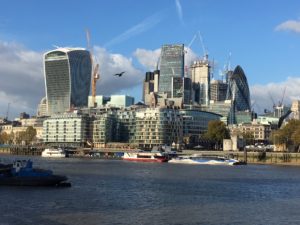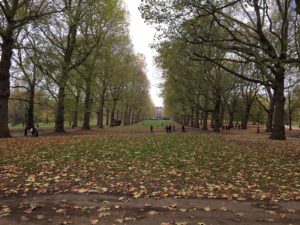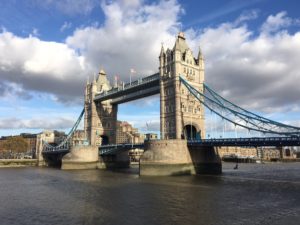We are losing a war that most if us don’t even know we are fighting. That was the sobering message delivered by CNN Chief Foreign Affairs Correspondent Jim Sciutto at the Cleveland City Club yesterday.
For three decades, China and Russia have been conducting carefully calibrated, disciplined, and effective campaigns to reduce America’s global power and influence, said Sciutto. Their tools have included cyber-attacks, theft of intellectual property, espionage, territorial acquisition, murders of dissidents, weapons in space, improvements in submarine technology, and increasingly aggressive military actions.
None of these efforts have been secret, said Sciutto. The Russian invasion of Ukraine, Chinese construction of military facilities on disputed islands in the South China Sea, Russian attempts to murder dissidents in London, Chinese theft of intellectual property, Russian interference in American elections and many other efforts are all well-known.
But the U.S. has responded to each incident as individual events, when, if fact, they were all elements of concerted and coordinated campaigns.
“We have failed to connect the dots,” said Sciutto. As a result, our responses have been ineffective. “We need to look at the full spectrum of Chinese and Russian actions.”
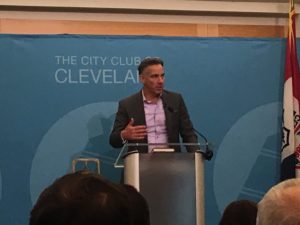
CNN Chief Foreign Correspondent Jim Sciutto at the Cleveland City Club
China and Russia are not conducting a joint campaign, said Sciutto. Their relationship is still marred by distrust, vast cultural and historic differences, and a long history of enmity. But they share an interest in rolling back U.S. power and influence, and they have adopted similar strategies. “If they see a convergence of interests,” he said, “they will cooperate.”
Both nations are pleased to see the United States retreat from global commitments, promises, and agreements. America’s withdrawal from Syria allowed Russia to increase its influence in the region and also gain access to a warm-water port on the Mediterranean Sea. America’s reluctance to confront China in the South China Sea has greatly strengthened China’s position there.
China and Russia have been careful to keep their actions below the threshold that would prompt an American military response, Sciutto said. The actions we have taken – warnings, sanctions, and military deployments – have not worked.
The United States has had ample evidence for years that Russia and China have been conducting deliberate campaigns aimed at reducing US power and influence, said Sciutto. But administrations from both parties, “have either ignored it or believed that their behavior will change over time.”
We have overlooked the significant differences between the United States and China and Russian, thinking they were more like us than they actually are, said Sciutto. In reality, their cultures, histories, economies, and politics are vastly different than ours. But we persisted in imagining that Russia and China want what we want, or that they will evolve to become more like us.
Not only has the U.S. response been ineffective, said Sciutto, but American leaders have not spoken out about Chinese and Russian attacks in a way that the American people can understand.
Today, U.S. government and military organizations recognize the growing threat from China and Russia and are taking positive steps, said Sciutto. But our failure to recognize the danger earlier has given both nations a head start. “We are way behind.”
Sciutto is not advocating a military response to Chinese and Russian non-military actions. But he believes that the United States must develop a coordinated, whole-of-government response that is based on a well-thought and considered strategy.
But even as American military and intelligence leaders are beginning to address the situation, the highest levels of the Trump administration continue to disbelieve or deny the threat, said Sciutto.
“We make it a heck of a lot easier for Russia and China by battling among ourselves, even in the face of incontrovertible evidence because some people see political advantage in denying Russia and China’s actions,” said Sciutto. “They do Russia’s work for them.”
Officials in U.S. military and intelligence agencies crave effective leadership from the top, said Sciutto. “They are not seeing it, and it is something we need to succeed.”
For a more detailed discussion, see Jim Sciutto’s book The Shadow War: Inside Russia’s and China’s Secret Operations to Defeat America; HarperCollins; New York; 2019.
top image: Chinese and Russian warships in formation in 2016. (Photo: Xinhua)
June 11, 2019
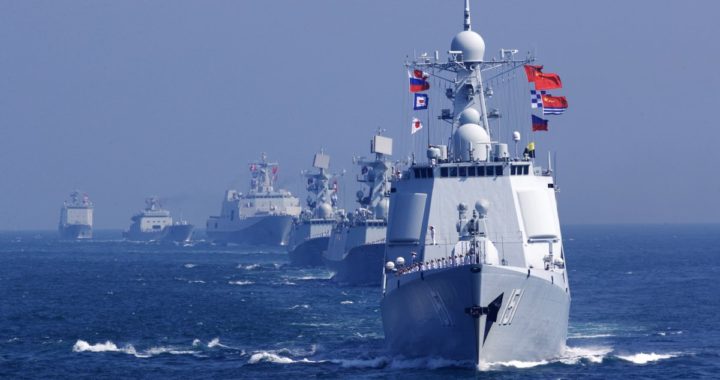


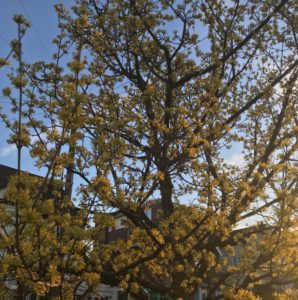

 Just returned from a week in London, where our daughter will be attending university.
Just returned from a week in London, where our daughter will be attending university. The city is more crowded and diverse than I expected. Of the two, the crowds were more surprising. Shopping districts, museums, and parks all seem to be well-attended. At times, they are uncomfortably crowded. Not exactly sure why I didn’t expect the city to be crowded, as it was the most populous city on earth from 1831 until 1925. Today, it has more international arrivals each year than any other city. As for diversity, well, London was the center of a world-wide empire for hundreds of years, so it has always drawn migrants, immigrants, visitors, merchants, financiers, and government officials from all over the planet. While the empire is no more, London has remained one of the most accessible and open of the world’s great cities.
The city is more crowded and diverse than I expected. Of the two, the crowds were more surprising. Shopping districts, museums, and parks all seem to be well-attended. At times, they are uncomfortably crowded. Not exactly sure why I didn’t expect the city to be crowded, as it was the most populous city on earth from 1831 until 1925. Today, it has more international arrivals each year than any other city. As for diversity, well, London was the center of a world-wide empire for hundreds of years, so it has always drawn migrants, immigrants, visitors, merchants, financiers, and government officials from all over the planet. While the empire is no more, London has remained one of the most accessible and open of the world’s great cities. “Aesthetically speaking, London is just beautiful; it’s a gorgeous city. The architecture, the monuments, the parks, the small streets – it’s an incredible place to be.” – Sara Bareilles
“Aesthetically speaking, London is just beautiful; it’s a gorgeous city. The architecture, the monuments, the parks, the small streets – it’s an incredible place to be.” – Sara Bareilles